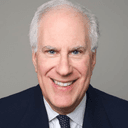Why You Should Be Invested Today
Editor's note: Don't be this type of investor...
Between high inflation, geopolitical conflict, and an upcoming presidential election, the markets are filled with uncertainty right now. Many investors are tempted to hide their money on the sidelines to protect their wealth amid this market chaos.
But the truth is, you can still find ways to profit amid this rampant market turbulence...
That's why Marc Chaikin – founder of our corporate affiliate Chaikin Analytics – argues that it's crucial for investors to avoid letting fear guide their investment decisions to continue growing their wealth.
In today's Masters Series, adapted from the May 17 issue of the Chaikin PowerFeed e-letter, Marc explains why investors should avoid remaining idle while this uncertain market unfolds...
Why You Should Be Invested Today
By Marc Chaikin, founder, Chaikin Analytics
Interest rates have come down from their peak...
The Federal Reserve cut rates by 50 basis points at its meeting earlier this week, marking the first rate cut since March 2020. And this shift in the central bank's inflation-fighting strategy comes amid a softening labor market.
But the yields on some money-market accounts are still above 5%. That means any cash you have in the bank is earning more than it has in decades.
So I'm not surprised to see the following question from some of my readers at Chaikin Analytics...
"What percentage of my investments should be in cash?"
It's an important question. But it misses the larger point of investing...
After all, our goal is to make money. We don't want to just sit on the sidelines in cash.
The economic uncertainty we're facing has fooled some investors into thinking that sitting on the sidelines is making money. But as I'll show you today, that's a huge mistake.
Let me make one thing clear first...
Chaikin Analytics explicitly does not give individualized investment advice. We're legally not allowed to do that. And the amount of cash you keep on hand is a highly personal number.
We can talk generally, though...
Every investor should have a "sleep well at night" baseline. We should all have a specific amount of cash on hand to pay any expenses if our primary income stream dries up.
You don't want to be forced to liquidate your holdings in the middle of a personal financial crisis. And in that situation, you certainly don't want to just hope for the best price.
Now, with that said, we can get to the important question...
Should you have excess cash as an asset in your investment portfolio?
Obviously, cash pays well today. Or at least, that's what it seems like on the surface.
But in the larger context of the market environment, it's not as good as it looks...
The financial world is full of competition for your money.
Sure, interest rates are still high despite the Fed's aggressive rate cut. But stocks are soaring, too.
The S&P 500 Index is up around 32% over the past year. The tech-heavy Nasdaq 100 Index is up 39% in that span. And of course, many individual stocks are doing even better.
We're talking about massive returns. Those types of returns can help us build huge retirement accounts.
If you're younger than 50 years old, you need to be growing your assets significantly so you can live comfortably in your later years. That's the point of investing for retirement.
It's not good enough to sit on the sidelines in cash...
Sitting on cash is effectively choosing not to grow your retirement funds. Even worse, the 5% yield on your savings doesn't look so big when you account for "real" interest rates...
Real interest rates are simply the returns you make on your money after factoring in inflation. That's incredibly important because cash in the bank is always losing value.
In the U.S., inflation doesn't seem too bad at first. Even today, it just fell to a three-year low at 2.5%.
But over the longer term, the math of our situation becomes unavoidable...
If you have $100,000 in cash and inflation is at 2.5%, sitting on the sidelines costs you $2,500. So even with a yield of 5%, your "cash asset" only makes $2,000 for the year.
Folks, that's not an investment.
Meanwhile, just putting your money to work in the broad market would have turned your $100,000 into roughly $126,000. And it could have been much better with other investments.
In short, cash isn't an investment. Instead, think of it as a tool...
It's the liquid money we keep on hand to buy goods and services. Everyone's situation is different. But we all need to hold enough cash to handle any personal financial crisis.
And remember... at the end of the day, the stock market is how we really grow our retirement accounts.
Good investing,
Marc Chaikin
Editor's note: Whether you're putting your money to work in the markets or are hiding it on the sidelines, the Fed's recent decision could drastically impact your wealth.
That's why Marc recently hosted an online presentation to share an urgent warning about where the Fed's decision could send markets. Catch up on the full details here...

